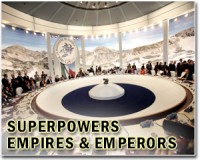| . |  |
. |
Hanoi (AFP) Oct 24, 2010 Behind the official handshakes and smiles at this week's 16-nation Asian summit in Vietnam, China's increasingly assertive behaviour means the region will be in an apprehensive mood, analysts say. Possible talks between Chinese Premier Wen Jiabao and Japanese counterpart Naoto Kan on the summit's sidelines are in doubt amid the two countries' worst diplomatic row in years, centred on a disputed East China Sea island chain. At the same time, the United States and Southeast Asian countries are concerned over China's increasingly muscular approach to maritime sovereignty in the South China Sea, where several regional nations are claimants. "The level of apprehension is high, as many believe we are getting a preview of what China will look and act like once it has risen," said Ralph Cossa, president of the Asia Pacific arm of the Center for Strategic and International Studies in Washington. "This is what has people concerned," he said, as leaders prepared to travel to Hanoi for the 10-nation Association of Southeast Asian Nations gathering starting Thursday, and Saturday's wider 16-nation East Asia Summit. China and the US, represented by Secretary of State Hillary Clinton, will also wade through a host of other disputes involving trade, human rights, and the value of the yuan. "China will of course feature large," said Damien Kingsbury, a Southeast Asia specialist at Australia's Deakin University. "The whole of Southeast Asia has experienced China being assertive." The East Asia Summit (EAS), established in 2005, is a forum for dialogue on strategic, political and economic issues involving the 10 ASEAN members as well as Australia, China, India, Japan, South Korea and New Zealand. As China's influence grows, calls for a counterbalance in terms of trade and foreign policy have led to plans to welcome the US and Russia into the EAS. A draft EAS chairman's statement says the group "formally decided to invite the leaders of Russia and the US to participate in the EAS starting from 2011". The invitation is expected to be issued to Clinton and Russian Foreign Minister Sergei Lavrov, who will attend these talks as "special guests". China has also adopted a more assertive military stance, expanding its naval reach with new ships and submarines in what Beijing says is a purely defensive move. It claims all of the South China Sea including the Paracel and Spratly archipelagos, potentially resource-rich rocky outcrops which straddle strategic shipping lanes. Taiwan and ASEAN members Brunei, Malaysia, the Philippines and Vietnam also have whole or partial claims over the region. This has led to anxiety, said Pavin Chachavalpongpun, a fellow at the Institute of Southeast Asian Studies in Singapore. "These countries believe that China will not compromise when it comes to the issues related to its sovereignty," he said. Adding to their nervousness, China favours a bilateral approach in dealing with individual claimants, Pavin said, while ASEAN nations are intent on adopting a united stand which will give them more bargaining power. Clinton and other delegates raised the South China Sea issue at an ASEAN-led security forum in July, drawing indignation from China. Clinton said that resolving disputes over the strategic area, a vital conduit for transport of goods and oil, is "pivotal" to regional stability and that the US has an interest in "open access to Asia's maritime commons". American Defence Secretary Robert Gates took up the theme this month at defence ministers' talks attended by his Chinese counterpart. Pavin expects the US will raise the issue again at this week's talks. To the north, a dispute still simmers between China and Japan after Tokyo on September 8 arrested a Chinese trawler captain near Japanese-administered islands, known as Senkaku in Japan and Diaoyu in China. Beijing reacted with a barrage of diplomatic protests, snubs and other punitive steps, while Washington assured Tokyo that the islands are covered under a security treaty that requires the US to defend Japan. "I think the Chinese understand they pushed too hard on the East China Sea issue and that they need to start being a bit more gracious," said Cossa.
Share This Article With Planet Earth
Related Links Learn about the Superpowers of the 21st Century at SpaceWar.com Learn about nuclear weapons doctrine and defense at SpaceWar.com
 China 'shocked' by Japan FM's comments as two sides meet
China 'shocked' by Japan FM's comments as two sides meetBeijing (AFP) Oct 19, 2010 China on Tuesday said it was shocked by the latest comments from Tokyo in a simmering row over a group of disputed islands, as the two sides held informal talks in a bid to ease tensions. The latest volley in the war of words between Asia's top two economies came after three days of sporadically violent anti-Japan protests in several Chinese cities - the largest such demonstrations since 20 ... read more |
|
| The content herein, unless otherwise known to be public domain, are Copyright 1995-2010 - SpaceDaily. AFP and UPI Wire Stories are copyright Agence France-Presse and United Press International. ESA Portal Reports are copyright European Space Agency. All NASA sourced material is public domain. Additional copyrights may apply in whole or part to other bona fide parties. Advertising does not imply endorsement,agreement or approval of any opinions, statements or information provided by SpaceDaily on any Web page published or hosted by SpaceDaily. Privacy Statement |